Package Contains: 1 x CARBONX CF PEKK-A [AEROSPACE] - Black / 1.75mm - 3DXTech
CarbonX? Carbon Fiber PEKK-A (PolyEtherKetone)
Aerospace-grade performance is made possible using PEKK (60/40 copolymer) and Toray T-800 aerospace grade cut carbon fiber. This combination creates one of the highest performing polymer composites in the world. A leading material in the PAEK family, PEKK has exceptionally good mechanical, thermal and chemical resistance properties. In addition, it is not only substantially easier to mold than PEEK.
Toray® Aerospace-Grade premium carbon fiber reinforcement makes this compound purpose-built for extreme applications that require extreme thermal, mechanical and chemical resistance properties. CarbonX? PEKK products have a lower melt temperature as well as a lower speed and degree of crystallinity than PEEK, which contributes to the remarkable ease of printing.
Advantages of CF PEKK-A (Aerospace) includes:
Substantially easier to 3D print than PEEK
Wide processing window from 345-375°C
Tg of 160°C, HDT of 150°C and a Tm of 305°C
Inherently flame resistant (UL94 V-0)
Low smoke production
Exceptional mechanical, thermal and chemical strengths
Filament Specifications:
Diameter: 1.75 mm (+/- 0.05 mm)
Recommended print settings:
Extruder: 360-390°C
Platen temperature: 120-140°C
Nozzle: we currently recommend a hardened steel nozzle with a minimum diameter of 0.4 mm
Other: the ideal layer height is 60% of the nozzle diameter. We do not recommend printing layers lower than 0.2 mm with carbon fiber reinforced filaments
Platen preparation: we recommend the use of an adhesive or polyamide tape
Heated chamber: recommended, up to 140°C if possible.
Media: The ThermaX? HTS is designed to work with complex, high-temperature materials like this
Drying instructions: 120°C for 4 hours
Abrasive material
This material is particularly abrasive among 3D printing filaments. Users may find that standard brass nozzles are chewed up very quickly compared to standard wear. If worn, the nozzle diameter will expand inconsistently and the printer will encounter extrusion problems.
For this reason, we strongly recommend printing this material through a hardened steel nozzle rather than a softer metal. Hardened steel nozzles can often be inexpensive and easy to install depending on the printer manufacturer's instructions.
ThermaX? is a trademark of 3DXTech LLC, its owners and affiliates.
![CARBONX CF PEKK-A [AEROSPACE] - Black / 1.75mm - 3DXTech 500g Carbon 3DXTech 19210035 3DXTech CARBONX CF PEKK-A [AEROSPACE] - Black / 1.75mm - 3DXTech 500g Carbon 3DXTech 19210035 3DXTech](https://www.dhm-online.com/4900124-large_default/carbonx-cf-pekk-a-aerospace-black-175mm-3dxtech-500g.jpg)
![CARBONX CF PEKK-A [AEROSPACE] - Black / 1.75mm - 3DXTech 500g Carbon 3DXTech 19210035 3DXTech CARBONX CF PEKK-A [AEROSPACE] - Black / 1.75mm - 3DXTech 500g Carbon 3DXTech 19210035 3DXTech](https://www.dhm-online.com/4900124-home_default/carbonx-cf-pekk-a-aerospace-black-175mm-3dxtech-500g.jpg)
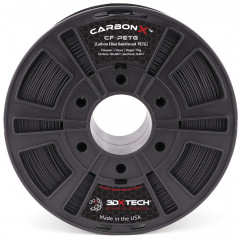
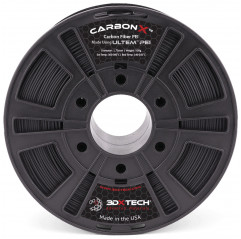
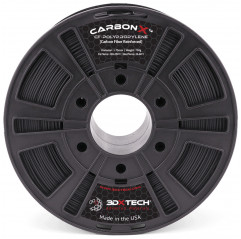
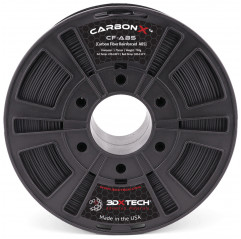
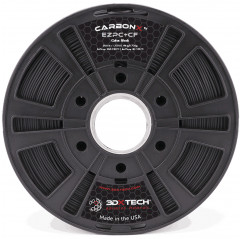
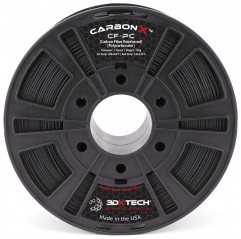
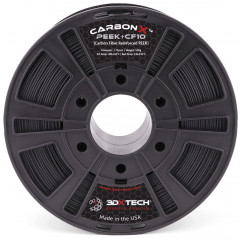
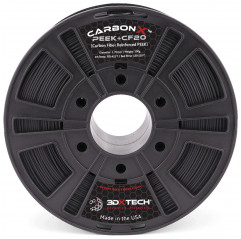

![CARBONX PA6+CF GEN 3 [CARBON FIBER NYLON] - Black / 1.75mm / 500g - 3DXTech Carbon 3DXTech 19210041 3DXTech](https://www.dhm-online.com/4900128-home_default/carbonx-pa6-cf-gen-3-carbon-fiber-nylon-black-175mm-500g-3dxtech.jpg)
![CARBONX PA12+CF [CARBON FIBER NYLON] - Black / 1.75mm / 500g - 3DXTech Carbon 3DXTech 19210040 3DXTech](https://www.dhm-online.com/4900127-home_default/carbonx-pa12-cf-carbon-fiber-nylon-black-175mm-500g-3dxtech.jpg)
